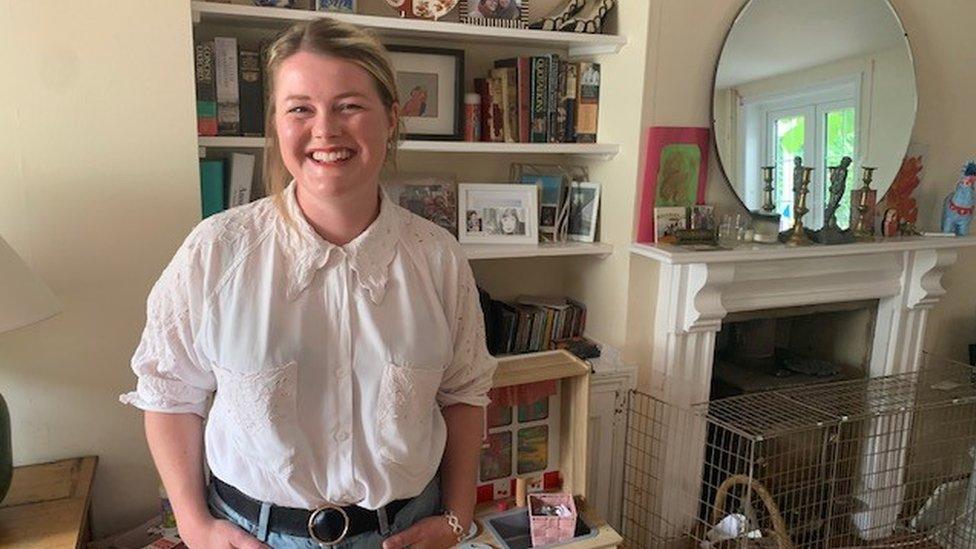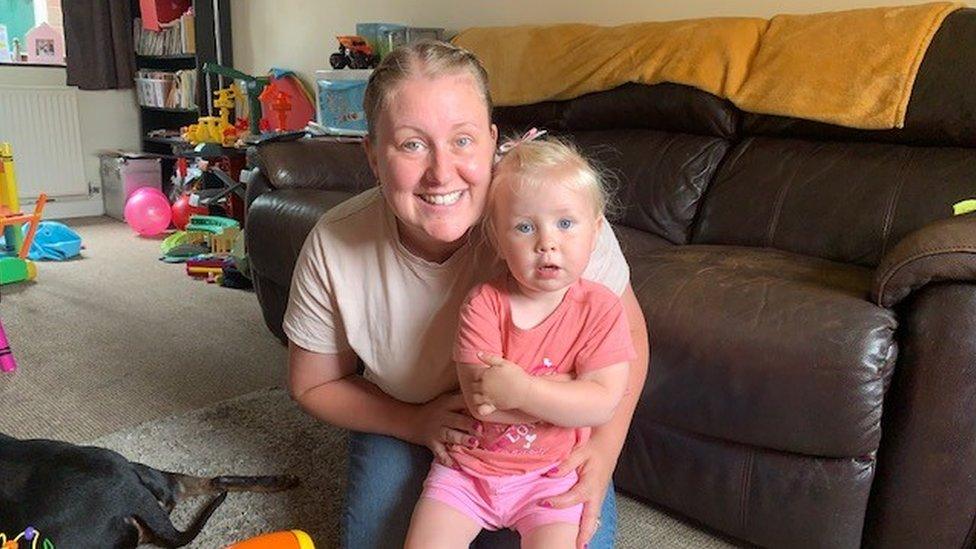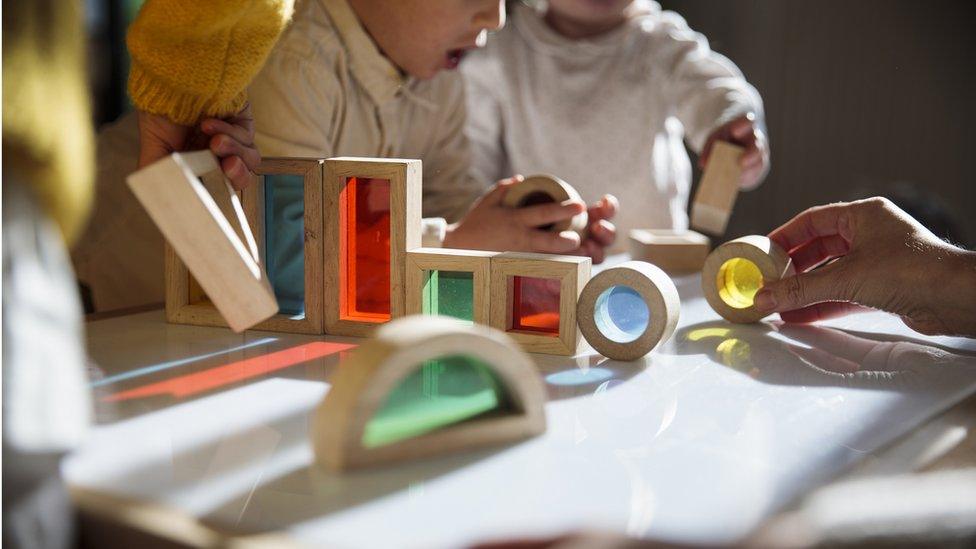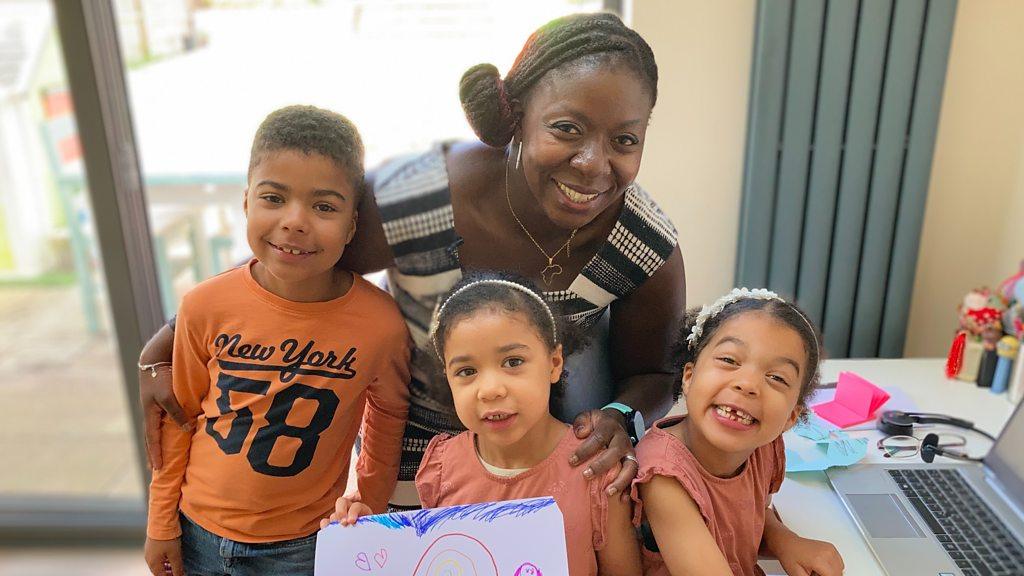Calls for childcare costs in the UK to be overhauled
- Published

BBC journalist Esme Ashcroft with her partner Mike Nimmo and their son Teddy
There were a lot of things I underestimated when I was pregnant, and the cost of childcare was one of them.
Like many parents and carers I've had to reduce my hours at work and call on the help of grandparents to manage nursery fees.
And my partner and I aren't the only ones juggling this logistical and financial puzzle.
I spoke to other mums who are struggling with the price of bringing up their children.
At the moment the average cost of a full-time nursery place for a two-year-old is just under £14,000 a year in the UK according to the National Childbirth Trust (NCT).
In Gloucestershire it is an average of £250 a week for 50 hours.
'I can't work full time'
Isobel Laing, from Cheltenham, who works for Bristol South Labour MP, Karin Smyth, is a single parent to three-year-old Rufus.
She works four days a week and has previously spent up to 80% of her salary on nursery fees.
"The fact I can't work full-time because I can't afford full-time childcare has had quite a big impact on my career," she said.

Isobel Laing from Cheltenham has previously spent up to 80% of her salary on nursery fees
"It's frustrating to know I'm not in a position to take on a full-time job until my son goes to school, and even then you have to look at after-school clubs and childminders.
"With my house I'm lucky enough not to have to pay rent, but this means I can't afford to move because I definitely can't afford childcare and rent out of my income. It's made me stay in one place and restricted me to part-time work," she added.
Ms Laing wants to see a complete overhaul of the childcare system in the UK to bring costs down for parents and make it more accessible for those on lower incomes.
"I think the government really needs to look at what money they're giving to nurseries and ensure what they're already doing is properly subsidised, but also take a holistic view going forward," she said.
"I feel like it's frustrating the things you think are going to help benefit you don't help you as much as you thought they would," added Ms Laing.
Parents balancing costs
The UK has the second most expensive childcare costs in the world, according to the Organisation for Economic Co-operation and Development (OECD) with fees costing almost two thirds of families as much as their monthly mortgage and rent payments.
The government provides 30 hours of free childcare across 38 weeks of the year to parents in England once their child turns three.
But critics say this should be extended to universally cover all 52 weeks, and the age lowered to make it easier for parents to return to work earlier.
It seems like almost everyone has their own story of how they balance out costs.
While researching this piece I put a couple of posts out on Facebook, and it is one of the biggest responses I have had to a story.

Becki Wilson with daughter Rosie
One mum said she has to do a 60-mile round-trip to drop her daughter at a grandparents' house because she cannot afford to put her in nursery full-time.
Another said she had to change jobs, because full-time childcare was too expensive and her employer wouldn't allow her to reduce her hours.
Becki Wilson lives in Tewkesbury with her husband Rob, five-year-old son Billy and daughter Rosie, who is two next month.
Ms Wilson gave up her job as a dental nurse when Rosie was born and now works part-time as a cleaner, taking Rosie with her.
"When I had Billy I was able to continue my job as a dental nurse, he went to full-time nursery and we could manage that as a household," she said.
"But since having another child that would mean paying two lots of childcare, full-time nursery for Rosie and then before and after school provisions for Billy. The cost of those alone would be more than what I would earn as a full-time working mum.
"It makes me feel a bit gutted, as I was a dental nurse for nearly 15 years. I know we'd do anything for our children, but to leave your whole career for the sake of childcare is a bit naff really," she added.
Ms Wilson said they have no plans to have another child, but financially it would be impossible.
"If we were to have another child, I don't know what we would do," she added.
"I don't know what the answer would be, because there's no way we could afford it."
'Choice and availability'
The government says it's working to bring down the costs of childcare through additional investment and training.
A spokesperson for the Department of Education said: "The Education Secretary and Prime Minister have been clear supporting families with the cost of living and access to childcare is a priority.

The UK has the second most expensive childcare costs in the world
"We are working with colleagues across government to look for ways to improve the cost, choice and availability of childcare places.
"We have spent more than £3.5 billion in each of the last three years to deliver the free childcare offers, including the 30 hours per week which is supporting thousands of working parents and we're investing millions in Family Hubs which provide services and support for families."
Calls for free childcare
But national charity, Pregnant then Screwed, which campaigns to end the "motherhood penalty", says free childcare needs to be available to everyone.
Founder and director, Joeli Brearley, said: "I cannot see why that is such a radical proposal, people look at me like I'm mad when I say this.
"But we have a free education system, a free healthcare system, why is it so insane to say we should have a free education system for children under five year's old?"
Ms Brearley said engagement in the issue comes down to the culture of decision makers, and other countries across the world view bolstering childcare as an investment.
"We've recently seen Japan, Switzerland and Australia have all pledged to invest in their childcare sectors," she added.
"Canada has pledged to invest $30 billion to create a system that costs just $10 a day and they haven't done this out of the goodness of their hearts.
"They've done it because they've crunched the numbers and they've found that for every dollar you invest in childcare they get between $1.50 and $2.80 back in to the economy.
"So other countries are leading the way on this, while we're resting on our laurels."

Follow BBC West on Facebook, external, Twitter, external and Instagram, external. Send your story ideas to: bristol@bbc.co.uk , external
- Published20 May 2022
- Published1 September 2021
